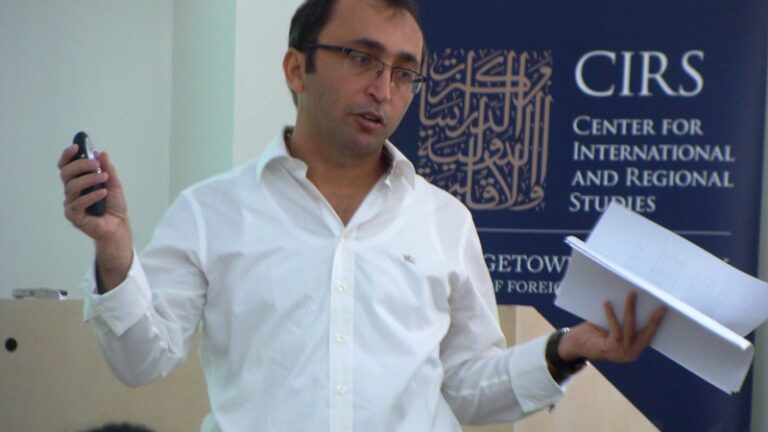Dialogue Series, Regional Studies
Birol Baskan on the 2010 Turkish Referendum

Birol Başkan, Visiting Assistant Professor of Government at the Georgetown University School of Foreign Service in Qatar, delivered a Focused Discussion on the topic, “Turkey at the Crossroads: The Last Referendum and its Implications” on October 6, 2010. Başkan’s talk focused on how the September 12, 2010, referendum in Turkey left the country at the crossroads of choice. Did Turkey move towards a more liberal democracy or towards religious authoritarianism? The decision to vote “yes” or “no” was considered to be a decision between “Islamism” and “secularism” in Turkey, he argued.
The 2010 referendum mainly revolved around making constitutional changes to the judiciary and the outcome was that “21 million people said ‘yes’ and 15 million people said ‘no.’ So, the referendum was in favor of the amendments introduced by the Justice and Development party,” Başkan said.
These changes are historically significant. Exactly thirty years ago, the professor said, “the 1980 military coup in Turkey left incredible scars on Turkish historical memory:” The parliament and various political parties were closed down, and political leaders were arrested, expelled, tortured, and killed. During that turbulent time, “the Turkish military destroyed all the societal networks – the leftist and the nationalist groups in Turkey – and, unintentionally, prepared the ground for Islamic revivalism.” As a result of the coup d’état, the 1982 constitution was enshrined, which, Başkan argued, “established the foundation of the contemporary political system in Turkey.”
The agenda regarding the establishment of the constitution, according to Başkan, had two basic objectives: “to insulate the high echelons of the state against political influence and to set boundaries around political action and discourse.” In order to achieve these, the government played a secondary role in making appointments. For example, “In making military appointments, military promotions, and military expulsions, the government was a junior partner of the supreme military council,” he said. The constitutional court could thus act with impunity and had closed down 21 political parties, which is a record in Europe.
The problem with this type of a governance structure is that it lacks democratic legitimacy and so “the judiciary does not feel obliged to follow what the society wants, but only serve the higher interest of the state.” As such, “the Turkish state in all high level appointments in the judiciary and the military is a self-regulating institution.” In other words, it has a democratic façade.
In 2007 there was a referendum that didn’t attract so much international media speculation. In this referendum, the people voted for Turkey to make a transition from a parliamentary system to a semi-presidential system where the public elects the president. Başkan argued that “the October 2007 referendum added considerable strength to the democratic legitimacy of the appointment system in Turkey by making the president popularly elected, and the September 12, 2010, referendum paved the way for the possibility of a broad sector of judges and prosecutors to rise to the top. This will dilute the ideological rigidity of the Turkish judiciary” and much more democracy-loving personnel can hopefully rise to the higher echelons of the country’s governance.
In conclusion, Başkan said that these reforms raised once again the question: “Where is Turkey heading?” Currently, “Turkey has made a huge leap towards liberal democracy,” but, he said, “this is not enough. Turkey should introduce stronger measures to improve freedoms and rights” such as freedom of speech and freedom of religion. For many years, the Turkish legal education system had been extremely successful in “training men of law who feel obliged to serve the state and the regime, not the society,” but in future, “Turkey needs to train democracy-loving and democracy-respecting generals, judges, prosecutors, and state university professors” in order to complete the transition towards becoming a full liberal democracy.
Başkan received a B.A. in International Relations and in Economics from Koc University, Istanbul, Turkey in 1998 and a Ph.D. in Political Science from Northwestern University in 2006. Başkan taught at State University of New York-Fredonia in 2006-2007 and at Qatar University in 2007-2010. His research looks at the roles religion, religious institutions, and grassroots religious groups play in creating, maintaining, undermining and destroying political order in the Middle East. He recently completed a book manuscript contracted to Syracuse University press. Currently, he works on several projects, one of which is a book project analyzing the role of religion in state and nation building in the Gulf. At SFS-Qatar, Başkan teaches courses on comparative politics, religion and politics, and methodology.
Article by Suzi Mirgani, CIRS Publications Coordinator